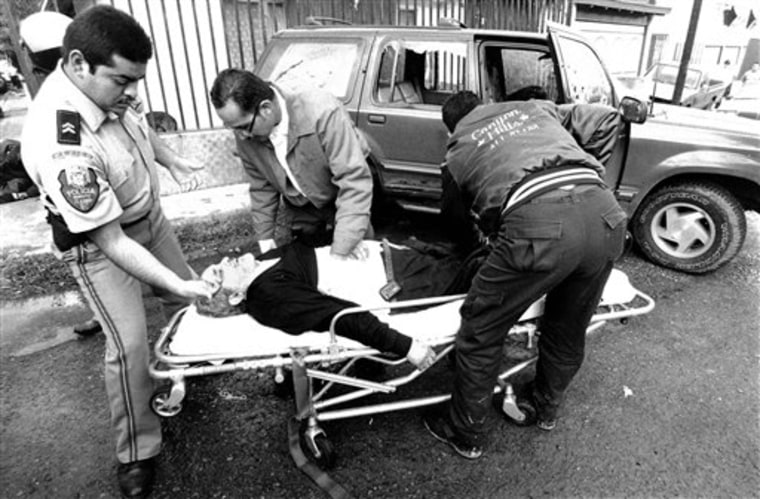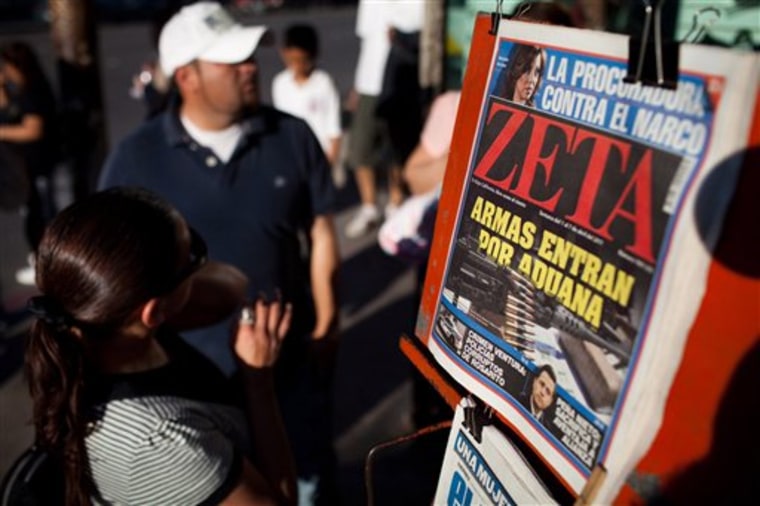The first time Adela Navarro saw her longtime mentor cry was when a top editor at their muckraking newspaper was murdered leaving a health clinic with his two young children.
"How many more deaths do I need to understand that we can't do this?" asked Jesus Blancornelas, who narrowly escaped an attempt on his own life after the weekly he co-founded made its mark with aggressive coverage of Mexican drug traffickers and complicit government officials.
Navarro, who was hired while still a college student, pleaded with him not to shut down the paper.
"We cannot allow the bad guys to win," she remembers telling him.
Seven years later, Zeta is thriving on a weekly dish of who's who in the underworld of Mexico's Baja California peninsula, serving up exhaustive — and lurid — stories on the narco world that are rarely found in other Mexican news media. Navarro, 42, and Blancornelas' youngest son, Rene Blanco, 39, became co-editors shortly before Blancornelas died in 2006 at age 70 from cancer.
As the midyear Inter American Press Association meeting begins this week across the border in San Diego, Mexico's news organizations are increasingly threatened by drug cartels engaged in a battle against each other and the authorities. The conflict has claimed more than 34,600 lives, including those of at least 22 journalists, since the government launched an offensive against the cartels in late 2006.
Some newspapers in areas stricken by drug violence have been cowed into near silence. Some limit coverage to official government statements and news conferences. Shootouts in broad daylight go unreported.
Others still cover the story aggressively, though few, if any, with the the intensity or depth of Zeta, which published its first cover story on drug trafficking five years after it was founded in 1980.
The Tijuana tabloid relentlessly chronicled the rise and decline of the Arellano Felix family, one of Mexico's oldest drug cartels. Its bread-and-butter coverage, often supported by sealed court documents, details how drug traffickers allegedly infiltrate the government.
A story in 2007 linked a state attorney general to Mexico's Sinaloa cartel. More recently, the newspaper has reported the emergence of Juan Sillas, aka "Ruedas," or "Wheels," who authorities say has emerged as one of the border city's more brutal hit men.
In the past month alone, Zeta reported that a Sinaloa cartel operative was recruiting hit men in San Diego, that authorities freed alleged cop killers and that traffickers in small towns east of Tijuana paid off police to allow street-level drug dealing.
Zeta's editors say they are honoring Blancornelas and their colleagues who have been gunned down: co-founder Hector Felix in 1988, Blancornelas' driver, Luis Valero, in 1997, and editor Francisco Ortiz in 2004.
"It's not easy to take this route and commit to doing these investigations, but it's what we do," Navarro said, speaking in a newspaper conference room that features a portrait of Blancornelas above the manual typewriter he used as a cub reporter in the 1950s.
Zeta detractors say the paper is too cozy with the army amid allegations that military officials have tortured suspects or that some soldiers work for the mafia. Zeta bestowed its "Person of the Year" awards in 2008 and 2009 on army generals.

The army deserves credit in Tijuana, but Zeta's lack of critical coverage is surprising, said Vicente Calderon, editor of TijuanaPress.com, an online news service.
"They do very good work, but they rest on their laurels to a large extent," Calderon said. "Because of their reputation, they get access that others don't have."
Zeta's editors say there are no sacred cows. They note that Gen. Sergio Aponte and his successor as the region's army commander, Gen. Alfonso Duarte, presided over a return to relative calm in Tijuana after violence reached frightening heights in 2008. In their view, the army earned its kudos.
"If Duarte is doing a good job, we're going to say so," Navarro said. "If Duarte is not doing a good job, we're also going to say so. We are loyal to no one except our readers."
The newspaper takes safety precautions, including performing background checks on new sources and having an editorial board vet stories before reporting begins.
When Ortiz was killed after reporting that drug traffickers obtained fake ID cards from the state attorney general's office, Blancornelas insisted that his byline alone appear on investigative stories, even if material came from others. He figured that of all the staff, he was the one who was safe: The government had given him a round-the-clock security force of more than a dozen soldiers after an assassin's bullet lodged in his spine in the 1997 attack that killed his driver.
Following his retirement and to this day, the newspaper labels its drug-trafficking stories "Zeta Investigations," with no byline.
But the threats still come. Navarro says that in January 2010 she received a warning from a U.S. official who intercepted a phone call indicating that the Arellano Felix cartel planned to kill top editors. The Mexican army confirmed the threat and assigned seven soldiers each to the top three editors for more than two months, until after the suspects were arrested.
Zeta's sources are often government whistle-blowers. Tips come from readers — and reporters at other newspapers that don't cover drug trafficking with Zeta's zeal.
"There are honest people in every government agency, and we try to find them," Rosario Mosso, a top editor, said, adding with a chuckle, "It gets more difficult all the time."
The memory of Zeta's fallen journalists looms large on its pages. Reprints of Blancornelas' works are a staple.
Every week, a full page with Felix's name and photo asks Jorge Hank, a businessman and former mayor of Tijuana, why Hank's former chief bodyguard killed the journalist. The bodyguard, Antonio Vera, is in prison for the killing. Hank has denied any connection to the crime.
Zeta's offices occupy a converted two-story house in a quiet, residential neighborhood of Tijuana, but the tabloid is printed in the San Diego area to avoid the fate of another muckraking newspaper that Blancornelas founded. ABC was stormed by union workers and forced to close down in 1979. Zeta blamed the governor for orchestrating the assault.
With a print circulation of about 30,000, Zeta is an anomaly as newspapers shift to the Internet. Every Friday at 4 a.m., bundles of the thick tabloid are hauled over the border to Mexico and hawked by hundreds of street vendors. Zeta doesn't post its stories on the Web until three days later and the site isn't updated during the week.
"The idea is to use the Internet to draw readers to the print edition, not replace it," said Mosso, 42, who joined Zeta straight from college.
The newspaper, which is owned by Blancornelas' wife, Genoveva Villalon de Blanco, relies largely on street sales, said son Rene Blanco, who started working there when he was 16. It doesn't disclose financial results, but Blanco says it posts a modest profit.
More than half of Zeta's Tijuana-based reporters cover sports, entertainment and the arts, but front-page stories are about drugs and corruption across political parties. Reporters' pay is decent by Mexican standards, but not spectacular: typically $210 to $250 a week, Navarro said.
For some readers, the newspaper's highly detailed accounts of constantly shifting alliances among drug traffickers and their bewildering array of nicknames is simply too much information on a disturbing subject. But Zeta is widely praised in Tijuana and throughout Mexico for its fearlessness.
"There are not a lot of examples of this kind of aggressive, investigative reporting in violent places at a time when violence has reached unprecedented levels," said Carlos Lauria, senior program director for the Americas at the New York-based Committee to Protect Journalists.
___
Online:
Zeta:
